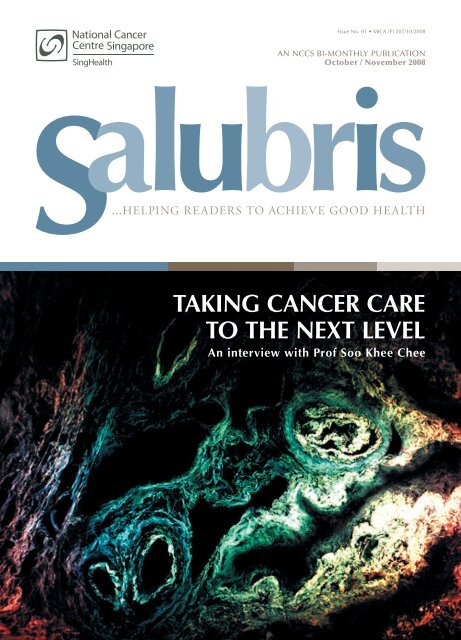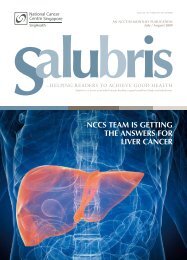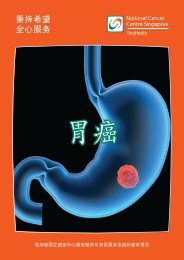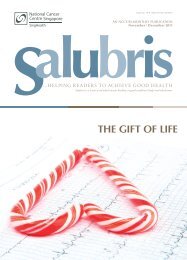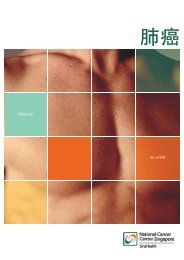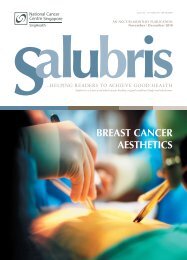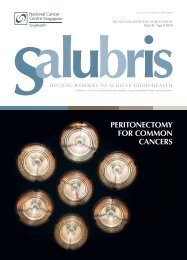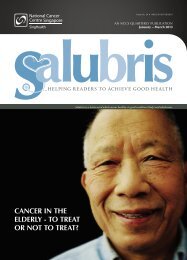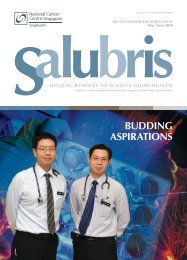Public Version - National Cancer Centre Singapore
Public Version - National Cancer Centre Singapore
Public Version - National Cancer Centre Singapore
Create successful ePaper yourself
Turn your PDF publications into a flip-book with our unique Google optimized e-Paper software.
Issue No. 01 • MICA (P) 207/10/2008<br />
an nccs bi-monthly publication<br />
October / November 2008<br />
...helping readers to achieve good health<br />
Taking <strong>Cancer</strong> Care<br />
to the next level<br />
An interview with Prof Soo Khee Chee
Page A2<br />
In Other Words<br />
SALUBRIS<br />
October / November 2008<br />
Taking <strong>Cancer</strong> Care<br />
to the next level...<br />
The <strong>National</strong> <strong>Cancer</strong> <strong>Centre</strong><br />
<strong>Singapore</strong> (NCCS) is known<br />
not just for its expertise in<br />
cancer treatment but as<br />
one of the key centres in<br />
cutting-edge research. Behind<br />
this success is its founding<br />
director Prof Soo Khee Chee,<br />
whose passion for research has<br />
put NCCS on the world stage.<br />
Be it 0730 hours or 1930 hours,<br />
whichever time of the day you<br />
pick, it is not uncommon to see<br />
the lights at his office on the fourth<br />
level of Goh Song Chiang Building.<br />
Not an unearthly hour, yet many of us<br />
would still be in our pyjamas. But not<br />
for Prof Soo Khee Chee. Tranquility for<br />
him is an opportunity to get his paper<br />
work done.<br />
In more than one way, Prof Soo, or just<br />
Prof, as he is affectionately known to<br />
his colleagues, wears many hats but is a<br />
man of few words.<br />
As NCCS Director, he is tasked with<br />
looking into policy matters and research<br />
projects. On his plate is the constant<br />
need to raise funds to support these<br />
research projects. He attends to patients<br />
at his clinic, performs surgery, and also<br />
shares his experience and expertise<br />
with his specialists, as well as teach the<br />
younger doctors. Not only that, he is the<br />
Vice Dean, Clinical and Faculty Affairs,<br />
of the Duke-NUS Graduate Medical<br />
School, and his latest additional role<br />
is his appointment as Assistant CEO of<br />
SingHealth Group overseeing research<br />
and education.<br />
Prof Soo is one of the<br />
pioneers who saw the birth<br />
of NCCS, and today runs it<br />
with clockwork efficiency,<br />
attending to the majority<br />
of public patients. He is the<br />
face of NCCS in the global<br />
fraternity and is one of the<br />
founders of the Asian <strong>National</strong><br />
<strong>Cancer</strong> <strong>Centre</strong>s Network.<br />
A firm believer in research, he is<br />
constantly strategising and encouraging<br />
his team of investigators and clinician<br />
scientists. His prime worry is finding the<br />
funds to keep their projects going. For<br />
the Penang-born professor, his efforts<br />
have not been in vain.<br />
Today, NCCS is an example of what a<br />
premier cancer centre should be. Teams<br />
of specialists from various medical<br />
disciplines work together, supported by<br />
a talented pool of clinician scientists,<br />
focusing on how the patients can benefit<br />
from their discoveries. On hand are<br />
also the latest medical equipment, for<br />
example in radiation technology, so that<br />
they can also leverage on advances in<br />
IT to complement their efforts. NCCS, as<br />
part of its comprehensive service, also<br />
offers patients psycho-social counselling<br />
and carries out a whole menu of support<br />
programmes to help patients journey<br />
through their illness.<br />
Doctors at NCCS also carry out clinical<br />
trials as they have a wide patient base<br />
which is required for any trial to be<br />
effective. This also means that the<br />
doctors get to see the different types of<br />
cancer and hence are better exposed<br />
and experienced in responding to the<br />
patients’ needs.<br />
When asked about how things have<br />
turned out so far, a modest Prof Soo said:<br />
“I am pleasantly surprised that it has<br />
worked out better than we thought.”<br />
There were several issues that were<br />
important for NCCS at the time of its<br />
inception. One was to be able to create<br />
various multi-disciplinary segments so that<br />
sub-specialist care can be given to the<br />
patients in an efficient and timely manner.<br />
“This has turned out well because we are<br />
now able to offer a comprehensive range<br />
of specialist care in each of the major<br />
cancer groups,” he added.
Today, NCCS is an example of what a premier cancer centre should<br />
be. Teams of specialists from various medical disciplines work together,<br />
supported by a talented pool of clinician scientists, focusing on how the<br />
patients can benefit from their discoveries.<br />
Page A3<br />
In Other Words<br />
SALUBRIS<br />
October / November 2008<br />
Prof Soo, who was recently<br />
conferred the first national award<br />
by the Ministry of Health in<br />
recognition of his contribution to<br />
mentoring young doctors, is not<br />
one to rest on his laurels. One area<br />
where he feels things could have<br />
turned out better would be to<br />
house all cancer specialists under<br />
one umbrella, attending to cancer<br />
patients throughout <strong>Singapore</strong>.<br />
Getting<br />
the<br />
talents<br />
The other consideration involved<br />
recruiting highly talented scientists<br />
to generate a regular flow of in-depth<br />
research papers and create intellectual<br />
property in a productive way given the<br />
limitation in grants and other financial<br />
support for research projects.<br />
“NCCS is getting recognition for its<br />
work not only within <strong>Singapore</strong> and the<br />
region, but also globally,” said Prof Soo.<br />
In fact each year, he also schedules a<br />
few overseas trips to keep abreast of the<br />
latest in cancer treatment. He is also<br />
a sought-after speaker at distinguished<br />
overseas gatherings.<br />
“…But, what’s more important – winning<br />
the prize or curing polio? Of course<br />
it’s curing polio. It’s the science that’s<br />
important, not the recognition.”<br />
Prof Peter Courtland Agre 2003 Nobel Prize<br />
in Chemistry, in reference to Jonas Salk who<br />
though he made the polio vaccine, he never<br />
won the Nobel Prize.<br />
Some high profile research discoveries included the works by Dr Kon Oi Lian on<br />
developing cell-based treatments for metabolic disorders such as diabetes mellitus and<br />
haemophilia A; colorectal cancer vaccine and T cell therapy for nasopharyngeal cancer<br />
patients by Dr Toh Han Chong, and the role of the tumour-supressor genes, p53 and p73<br />
by Prof Kanaga Sabapathy.<br />
Now, NCCS has moved to the next level where it is sharing its expertise with others. Already<br />
it has proven to be a fertile training ground for grooming cancer specialists in <strong>Singapore</strong>,<br />
but now it has moved beyond its boundaries and are training specialists within the region.<br />
Doctors from Indonesia, Malaysia, Thailand, Vietnam are benefiting from this programme.<br />
Prof Soo, who was recently conferred the first national award by the Ministry of Health<br />
in recognition of his contribution to mentoring young doctors, is not one to rest on his<br />
laurels. One area where he feels things could have turned out better would be to house all<br />
cancer specialists under one umbrella, attending to cancer patients throughout <strong>Singapore</strong>.<br />
So far NCCS has helped the other hospitals to set up clinics to provide cancer services<br />
to their patients, such as at Changi General Hospital, KK Women’s and Children’s<br />
Hospital, <strong>National</strong> University Hospital and Tan Tock Seng Hospital.<br />
NCCS continues to be the only centre providing training for healthcare providers in<br />
palliative medicine, and with the setting up of the new Lien <strong>Centre</strong> for Palliative Care,<br />
the training programme is expected to benefit even more people.<br />
Asked how he retains talent within NCCS, he said the human resource structure is<br />
undergoing some robust changes, and the main clinicians and scientific investigators<br />
are now becoming faculty members of Duke-NUS Graduate Medical School. This<br />
Duke-NUS collaboration will help create a more intellectual milieu for the campus<br />
and advance the course of academic medicine. At the same time, it will train more<br />
specialists to meet the demand of a greying and expanding population.<br />
By Sunny Wee
Page A4<br />
In Focus<br />
SALUBRIS<br />
October / November 2008<br />
A Cure at what Price?<br />
– Searching for Personalised Yet Affordable Medicine<br />
For five years, Prof Huynh The Hung<br />
from the Laboratory of Molecular<br />
Endocrinology in <strong>National</strong> <strong>Cancer</strong><br />
<strong>Centre</strong> <strong>Singapore</strong> (NCCS) and his team<br />
have been working towards a noble dream.<br />
They embarked on a journey to<br />
come up with a personalised and yet<br />
affordable medicine to treat cancer.<br />
While personalised medicine is not<br />
new, most researchers are focused on<br />
looking for a treatment or drug that<br />
works in treating cancer.<br />
What sets this project apart is that the<br />
cost of therapy for the patient, should the<br />
treatment require more than two or three<br />
drugs, is another key consideration.<br />
Hence, Prof Huynh has to strike a<br />
tough balance, which could possibly<br />
explain why researchers often ignore the<br />
question of cost.<br />
This project entails taking tissues from<br />
a tumour of, for example, a liver cancer<br />
patient for implantation into the liver of<br />
six to eight mice. These SCID mice, as<br />
they are known, are immuno-deficient<br />
and they are commonly used as hosts for<br />
normal and malignant tissue transplants.<br />
This process is known as surgical<br />
orthotopic implantation and is believed<br />
to be available only in NCCS for research<br />
on hepatocellular carcinoma (HCC).<br />
The tumours are then allowed to grow<br />
in the mice while the team maps out<br />
several treatments for them using a<br />
combination of not more than three<br />
different drugs. These drugs are then<br />
administered to the mice as they would<br />
be to the patients. The mice are then<br />
monitored to gauge the response of the<br />
different drugs or combinations of drugs<br />
using the CT and PET scans.<br />
In doing so, it gives the team an idea<br />
of the combination of drugs that would<br />
work best for the respective patients<br />
whose tissues were grown in the mice.<br />
However, due to the underlying liver<br />
disease, not all patients are able to<br />
donate their tumour tissue for making<br />
xenografts and not all the HCC tissues<br />
from the patients will successfully grow<br />
in mice for drug testing. Furthermore,<br />
many patients may not have enough<br />
time to wait for the test results or be<br />
able to finance the surgical orthotopic<br />
implantation procedure or the drugs<br />
recommended. In these cases, Prof<br />
Huynh may still be able to find<br />
effective solutions by comparing the<br />
protein profile and/or gene signature<br />
of the affected patient with other<br />
patient-derived HCC xenografts in his<br />
therapeutic programme database to<br />
look for similarities and therapeutic<br />
regimens. Following this, he may also<br />
be able to recommend less expensive<br />
drugs that are likely as effective.<br />
Recently, NCCS joined hands with<br />
AstraZeneca, an Anglo-Swedish<br />
pharmaceutical firm, to test drugs to<br />
combat HCC. The combination of drugs<br />
being tested by the team is almost infinite.<br />
Apart from testing new compounds<br />
periodically provided by pharmaceutical<br />
companies, they may also combine the<br />
new compounds with existing drugs to<br />
see if better results can be attained. And<br />
even though Prof Huynh and his team<br />
now primarily deal with liver cancer,<br />
results of their work could potentially be<br />
used on other solid tumours.<br />
It was not smooth sailing for<br />
Prof Huynh when he first embarked<br />
on his research. In fact, it drew<br />
a lot of flak from the research<br />
community as tissues from patients<br />
were implanted and grown under<br />
the skin of the mice.<br />
But his persistence has finally paid<br />
off. With the new technique of<br />
surgical orthotopic implantation,<br />
many pharmaceutical companies<br />
have been approaching him to do<br />
pre-clinical testing for their new<br />
drugs. Hopefully, in the near<br />
future, this will result in patients<br />
having access to drugs that are<br />
personalised yet affordable.<br />
By Carol Ang
FACE OF A CANCER CELL<br />
Page B1<br />
Looking Forward<br />
SALUBRIS<br />
October / November 2008<br />
The structure or form of a cancer cell<br />
results from underlying abnormal<br />
genetic changes that it has undergone.<br />
Its features are best appreciated with<br />
the light microscope, and in general, a<br />
cancer cell will show an enlarged nucleus<br />
reflecting the accumulation of abnormal<br />
genetic material, and a conspicuous<br />
nucleolus indicating increased cell<br />
activity. Other typical alterations are<br />
nuclear pleomorphism, referring to<br />
variation in nuclear size and shape;<br />
and hyperchromasia, which also results<br />
from excess genetic material contained<br />
in its chromatin. Often, a cancer cell is<br />
described as revealing a high nuclearof<br />
benign cells. In such instances, other<br />
associated features of cancer are used<br />
to corroborate a malignant diagnosis.<br />
Do <strong>Cancer</strong> Cells Have a<br />
Recognisable Relationship<br />
with its Environment?<br />
<strong>Cancer</strong> cells in groups and nests,<br />
revealing pleomorphic nuclei,<br />
prominent nucleoli and mitoses.<br />
<strong>Cancer</strong> cells have the ability to invade the<br />
surrounding tissues. They form tonguelike<br />
groups and nests that permeate the<br />
stroma, sometimes even extending into<br />
blood vessels. The appearance of this<br />
irregular invasion is the underlying reason<br />
for its being called “cancer” which is<br />
derived from the latin word for “crab”.<br />
Structure of <strong>Cancer</strong> Cells<br />
In order to recognise a cancer cell, we<br />
need to be familiar with what makes a<br />
normal cell. A cell consists of a nucleus<br />
that contains the genetic matter, and<br />
cytoplasm which holds its organelles<br />
within a liquid environment. Cytoplasm<br />
is the cell substance between the cell<br />
membrane and the nucleus. Organelles<br />
are structures that are enclosed within<br />
its own membrane inside a cell and has<br />
a particular function. The nucleus has<br />
a small nucleolus that is involved in<br />
forming protein.<br />
cytoplasmic ratio, essentially implicating<br />
enlargement of the nucleus that occupies<br />
more of the individual cell volume. There<br />
is also increased mitotic (cell division)<br />
activity, reflecting rapid proliferation and<br />
growth of the cancer cells; abnormal<br />
mitoses such as tripolar mitoses may be<br />
seen. These characteristics of a cancer<br />
cell are termed anaplasia.<br />
Just as symmetrical and regular features<br />
lead to a pleasant face, anaplasia in a<br />
cancer cell is contemplated as ugly.<br />
<strong>Cancer</strong> Cell VS Normal or<br />
Benign Cell<br />
A normal or benign cell will not have<br />
the described abnormal changes. It will<br />
instead appear regular in shape and<br />
size, and the nucleus will generally<br />
have smooth contours. The chromatin<br />
(the readily stainable substance of a<br />
cell nucleus consisting of DNA and<br />
RNA and various proteins) is fine<br />
and the nucleolus inconspicuous.<br />
The nuclear-cytoplasmic ratio is<br />
not increased, and if mitoses are<br />
discovered, they are normal in<br />
appearance. There are some cancer<br />
cells that are very well-differentiated,<br />
such that their appearances mimic that<br />
Other Associated Features<br />
of <strong>Cancer</strong> Cells<br />
Since cancer cells grow very quickly,<br />
they can outstrip their blood supply,<br />
resulting in necrosis or cell death. There<br />
is haemorrhage or bleeding, due to new<br />
vessel formation accompanying the<br />
cancer growth, or destruction of vessel<br />
walls by the invading cancer cells. The<br />
connective tissue in which cancer cells sit<br />
can respond by evoking a “desmoplastic”<br />
reaction, which features loose fibroblastic<br />
stromal cells surrounding the cancer cell<br />
nests. The ability of cancer cells to invade<br />
blood vessels allow them to circulate and<br />
“metastasise” (spread) to other organs and<br />
tissues of the body, distant from the site<br />
of origin.<br />
Conclusion<br />
The cancer cell, while usually showing a<br />
fairly characteristic face, may sometimes<br />
assume less familiar appearances. It is<br />
important to understand that the cancer<br />
cell may have another countenance, and<br />
that a definitive diagnosis of malignancy<br />
relies on the careful interpretation of<br />
tissue and cell material by a pathologist.<br />
By Dr Tan Puay Hoon<br />
Head, Senior Consultant, Dept of Pathology,<br />
<strong>Singapore</strong> General Hospital
Page B2<br />
Looking Forward<br />
SALUBRIS<br />
October / November 2008<br />
What Should I Eat To<br />
Reduce My Risk of <strong>Cancer</strong>?<br />
Eating is widely regarded as one of life’s basic joys. It is not easy for anyone to<br />
change their dietary habits in response to advice about their health. However, with<br />
increasing awareness of cancer, people are starting to pay attention to the kinds of<br />
diet that may reduce the risks of eventually developing cancer.<br />
We have less hard evidence on this subject than we would like, reflecting the<br />
difficulties involved in reliably comparing dietary behaviours of people over a long<br />
period. However, the enormous amount of data that has been reported allow us to<br />
propose certain links between diet and cancer, as summarised in the table below:<br />
Dietary Factors that Increase<br />
Risk of Some <strong>Cancer</strong>s<br />
Obesity<br />
Processed food such as canned meat or<br />
“fast” (fried) food such as hamburgers and<br />
french fries<br />
Preserved (salted, cured, or smoked) food<br />
Red meat, especially if char-grilled<br />
Fat, especially animal fat or other<br />
saturated fat<br />
Excessive calories in any form e.g. sugar,<br />
starch, cakes, chocolates, soft drinks,<br />
beyond your daily energy requirement<br />
Alcoholic drinks especially if more than<br />
one per day<br />
Food that are contaminated by fungi that<br />
release mycotoxins (poisons produced by<br />
fungi), or by Helicobacter bacteria, e.g.<br />
rotten peanuts, stale meat or uncooked<br />
meat, certain mushrooms<br />
Chewing betel nut or tobacco<br />
What Else Can I Do?<br />
Exercise Regularly<br />
Dietary Factors that Reduce<br />
Risk of Some <strong>Cancer</strong>s<br />
Ideal body weight<br />
Wholesome grains and fibre e.g. whole<br />
wheat, bran, oatmeal, multigrain bread<br />
Fruits and vegetables e.g. broccoli, cabbage,<br />
carrots, tomatoes<br />
White meat e.g. fish and lean poultry<br />
(de-skinned)<br />
Low fat food and other unsaturated fats e.g.<br />
olive oil, omega-3 fatty acids (in fish)<br />
Exercise daily for at least 30 mins<br />
Folic acid found in green leafy vegetables<br />
e.g. spinach, asparagus, kai lan, peas<br />
and beans<br />
Properly stored food e.g. refrigerated<br />
Prompt disposal of food that have gone bad<br />
Meticulous oral hygiene (including<br />
dental flossing) to reduce bacterial growth<br />
Many factors such as genetics, diet, lifestyle, stress and environment being the most<br />
common have been linked to cancer. Like eating appropriately, regular exercise has<br />
been linked to a reduced incidence of cancer. There is increasingly convincing evidence<br />
that regular exercise may help to prevent cancer. Hence, cancer prevention would<br />
involve targeting these factors. Studies involving diet, smoking, alcohol and obesity,<br />
have indicated that obesity is a major risk factor of several types of cancer. Reviews<br />
have indicated that regular physical activity reduces the risk of colon and breast<br />
cancers. Exercise that targets the reduction of body fat causes changes in hormone level<br />
and enhances the immune system.<br />
Read Food Labels<br />
It pays to scrutinise the ingredients<br />
listed on labels. Manufacturers often<br />
use misleading terms such as “sea<br />
salt” instead of “salt”, or “sucrose” or<br />
“fructose” instead of “sugar”. Products<br />
that are labelled fat-free still contain<br />
fat, but have to have less than 5g of<br />
it to qualify as being “fat-free”. Here<br />
are some numbers to remember when<br />
reading labels and choosing products.<br />
Low-fat:<br />
Fat-free:<br />
Less than 3g of fat<br />
per serving<br />
Less than 5g of fat<br />
per serving<br />
Low-cholesterol: Less than 20mg per<br />
serving and less than<br />
2g of saturated fat<br />
Low-calorie:<br />
Calorie-free:<br />
Low-sodium:<br />
Less than 40 calories<br />
per serving<br />
Less than 5 calories<br />
per serving<br />
140mg or less<br />
per serving<br />
Keep Your Child Slim<br />
The best time to optimise dietary habits<br />
is in childhood and adolescence. Try<br />
to keep your children slim and active.<br />
Avoid feeding them foods that contain<br />
excess sugar, fat and carbohydrate, and<br />
encourage some exercise each day. After<br />
all, a lifetime of “healthy eating” may<br />
reduce cancer risk by as much as 30%<br />
to 50%, so it’s never too early to start!<br />
Calculate Your <strong>Cancer</strong> Risk<br />
You can estimate your risk of breast,<br />
bowel, uterine, ovarian, or prostate<br />
cancer by visiting the website<br />
http://www.yourcancerrisk.harvard.edu/.
LESSONS FROM SURVIVORS<br />
The lessons learnt after the diagnosis of cancer are common to many who have<br />
suffered from this disease, and perhaps a few are unique to our experience.<br />
Below is a compilation of valuable lessons learnt by survivors who had gone<br />
through the cancer journey, which we would like to share with our readers.<br />
Page B3<br />
Tender Care<br />
SALUBRIS<br />
October / November 2008<br />
Lesson 1<br />
As the greatest physician, God<br />
appreciates the value of a referral.<br />
Early detection and prevention is<br />
important. We went through many months<br />
of denial and postponement that allowed<br />
the cancer to advance. This can be totally<br />
prevented. For those of us who have a<br />
religion, we believe that God has given<br />
our doctors an arsenal of treatments and<br />
the will to find a cure. Whatever faith we<br />
have embraced, our own God wants us to<br />
have faith, but at the same time God wants<br />
us to seek out earthly assistance.<br />
Lesson 2<br />
Make sure your doctor understands<br />
that hope is a vital part of the<br />
practice of medicine.<br />
We heard repeatedly from our<br />
doctors that attitude and faith had<br />
an enormous effect on healing. One<br />
wonders why more physicians are not<br />
prescribing it. It is at least as effective<br />
as some of our medications.<br />
Lesson 3<br />
<strong>Cancer</strong> is NOT an<br />
infectious disease.<br />
We will always be grateful for the<br />
overwhelming love we received from<br />
friends and family. But we are saddened<br />
by several personal and professional<br />
friends who never once responded<br />
to our most basic need to show they<br />
cared. The silence is deafening.<br />
Lesson 4<br />
Avoid doomsayers.<br />
Just as it is vitally important to hear<br />
encouragement from friends and family,<br />
it is equally important to avoid those<br />
who deliver gloom and doom. Seek out<br />
people who radiate a positive glow, and<br />
stay away from those who drain your<br />
energy and confidence.<br />
Lesson 5<br />
The way you look affects<br />
the way you feel.<br />
It is terribly painful to lose one’s hair.<br />
But if it is going to happen, get a<br />
short haircut right away. It lessens the<br />
trauma as the hair comes out. Wigs<br />
can be an opportunity to experiment<br />
with the different look you fancy.<br />
Take special care to wear clothes that<br />
make you feel attractive. Pay attention<br />
to grooming and hygiene. Look for<br />
humour and find opportunities to<br />
laugh. It is one of God’s greatest gifts.<br />
Nothing can make you feel and look<br />
better than a smile.<br />
Lesson 6<br />
<strong>Cancer</strong> does NOT mean the<br />
end of a sexual relationship.<br />
It is not easy to talk about one of the<br />
most personal aspects of life. The<br />
closeness and bond between you<br />
and your partner during this time are<br />
critically important to maintain. While<br />
the period following the diagnosis and<br />
treatment requires untold patience<br />
and understanding, normal sexual<br />
relations can and should continue. It<br />
is important to discuss this with your<br />
doctor or nurse. They may be able to<br />
offer some helpful tips or advice.<br />
Lesson 7<br />
Listen more, look more<br />
and love more.<br />
<strong>Cancer</strong> changes everything. But it<br />
does not have to change everything<br />
for the worse. Even in this terrible<br />
situation, there is opportunity. It is<br />
important to slow down and reevaluate<br />
what and who is really<br />
important in life. <strong>Cancer</strong> can bring<br />
wonderful people into your life that<br />
will give you strength, love and<br />
special kindness.<br />
Lesson 8<br />
Listen more,<br />
look more and<br />
love more.<br />
Strengthen your faith.<br />
<strong>Cancer</strong> is a lonely disease but you do<br />
not have to go through it alone. We are<br />
no longer in denial and are able to go<br />
on with our lives feeling enriched and<br />
happier than ever. For many, having faith<br />
in a religion helps and for those who do<br />
not have a specific religion, talking about<br />
your illness with your close friends and<br />
relatives will help to strengthen your<br />
hope and confidence to cope with it. We<br />
have confidence in the future and know<br />
that no matter what cancer has in store,<br />
we are prepared for it.<br />
<strong>Cancer</strong> Support<br />
Programmes<br />
The <strong>National</strong> <strong>Cancer</strong> <strong>Centre</strong><br />
<strong>Singapore</strong> conducts support<br />
programmes for patients, their<br />
families and cancer survivors to<br />
address issues of living with cancer.<br />
For more information, please call<br />
the <strong>Cancer</strong> Helpline at 6225 5655 or<br />
email: cancerhelpline@nccs.com.sg<br />
Acknowledgement:<br />
Special thanks to all cancer survivors for<br />
sharing their thoughts and experiences.
Page B4<br />
SALUBRIS<br />
October / November 2008
Page B5<br />
SALUBRIS<br />
October / November 2008
Page B6<br />
SALUBRIS<br />
October / November 2008
Page B7<br />
SALUBRIS<br />
October / November 2008
Page B8<br />
Outreach<br />
SALUBRIS<br />
October / November 2008<br />
Upcoming <strong>Public</strong> Education<br />
activities / Programmes<br />
Event Name Date, Time, Venue Registration Details<br />
English Forum & Workshop –<br />
Understanding Arm<br />
Swelling in Breast <strong>Cancer</strong><br />
For breast cancer patients & healthcare<br />
professionals.<br />
Topics:<br />
i) Reducing the Risk of Lymphoedema<br />
ii) Non-surgical Treatment of Lymphoedema<br />
iii) Surgical Treatment of Lymphoedema<br />
18 Oct 2008, Saturday<br />
12pm to 5pm (English)<br />
Lecture Hall / Function Room, Level 4<br />
<strong>National</strong> <strong>Cancer</strong> <strong>Centre</strong> ;<strong>Singapore</strong><br />
11 Hospital Drive, <strong>Singapore</strong> 169610<br />
$5 per Person<br />
Call: 6225 5655 / 6236 9434 / 6236 9432<br />
Pink Bridges –<br />
Walk for the Women<br />
in Our Lives<br />
For breast cancer survivors & healthcare<br />
professionals.<br />
The Breast <strong>Cancer</strong> Awareness Month closes<br />
with a walk along the Southern Ridges Trail,<br />
from Mount Faber to HortPark.<br />
25 Oct 2008, Saturday<br />
4pm to 9pm<br />
HortPark, Hyderabad Road<br />
$10 for Adults<br />
$5 for Children (3 to 12 years)<br />
Dinner & goodie bag included<br />
Call: 6436 8294 / 6436 8283 for enquiries<br />
on the event. Registration by phone will not<br />
be accepted.<br />
<strong>Cancer</strong>Wise Workshop –<br />
DIET & FITNESS IN CANCER<br />
PREVENTION<br />
Speaker: Ms Hozaidah Hosain<br />
Principal Physiotherapist & Chief<br />
Lymphoedema Management<br />
SGH<br />
TOPICS:<br />
Mr Philip Chia<br />
Private Chef & Consultant<br />
Rice Cooking Studio, <strong>Singapore</strong><br />
i) The Role of Fitness in <strong>Cancer</strong> Prevention:<br />
Achieving Your Ideal Weight • Make<br />
Fitness Work for You – Choosing the<br />
Right Exercise • Benefits of Exercise &<br />
Fitness • Role of the Physiotherapist •<br />
Getting Fit After <strong>Cancer</strong><br />
ii) The Role of Diet in <strong>Cancer</strong> Prevention:<br />
Types of Diet to Reduce <strong>Cancer</strong> Risk •<br />
Dietary Myths and Misconceptions •<br />
Nutrition for <strong>Cancer</strong> Patients • Simple<br />
Healthy Cooking Tips, Rice Cooking<br />
Demonstration<br />
22 Nov 2008, Saturday<br />
1pm to 4.30pm (English)<br />
Function Room, Level 4<br />
<strong>National</strong> <strong>Cancer</strong> <strong>Centre</strong> <strong>Singapore</strong><br />
11 Hospital Drive, <strong>Singapore</strong> 169610<br />
$10 for <strong>Public</strong><br />
$5 for Healthcare Professionals<br />
CALL: 6225 5655<br />
EMAIL: cancerhelpline@nccs.com.sg
NCCS Activities In and<br />
Around the Community<br />
Page A5<br />
Community<br />
SALUBRIS<br />
October / November 2008<br />
<strong>Public</strong> Forum<br />
Advances in <strong>Cancer</strong> Research and Treatment<br />
28th June 2008<br />
HDB Convention <strong>Centre</strong> (HDB Hub), Auditorium<br />
A well-attended forum where<br />
NCCS medical oncologists, Dr Toh<br />
Han Chong and Dr Tan Min-Han,<br />
together with research scientist,<br />
Mr Johnson Ng, of Biochip<br />
Devises Pte Ltd, shared with<br />
audiences on the cancer research<br />
and treatment advancements.<br />
The forum, which was conducted in<br />
two sessions (Mandarin and English),<br />
highlighted topics such as:<br />
• Importance of Research in State-ofthe-Art-<strong>Cancer</strong><br />
Treatments<br />
• New Experimental Therapies<br />
• Converting Research to Bedside<br />
Treatment<br />
LIVER CANCER AWARENESS MONTH<br />
Liver cancer is the 4th most common cancer among men and ranks number two in terms of fatality.<br />
“Even so, there is potential hope for cure if individuals go for early detection and appropriate intervention,” said<br />
Prof London Lucien Ooi, Chairman of Liver <strong>Cancer</strong> Awareness Month (Liver CAM) also Deputy Director and Senior<br />
Surgical Oncologist at NCCS.<br />
Thus, to educate and update the public, general practitioners (GPs) and specialists on the disease, treatment<br />
options and prevention, NCCS held a public forum and sharing sessions with the medical professionals in<br />
conjunction with the 1st Liver CAM held in September 2008.<br />
<strong>Public</strong> Forum<br />
Liver <strong>Cancer</strong> and You ~<br />
Prevention and Treatment<br />
6th September 2008<br />
HDB Convention <strong>Centre</strong> (HDB Hub), Auditorium<br />
About 850 participants<br />
attended the English and<br />
Mandarin forum and found<br />
out more about liver cancer<br />
and related issues such as<br />
hepatitis B, which may lead<br />
to liver cancer.<br />
MEDICAL FORUM<br />
LIVER CANCER AND GPS ~ TREATMENT<br />
OPTIONS AND CASE STUDIES<br />
20th September 2008<br />
MAKING SENSE OF LIVER<br />
CANCER MANAGEMENT<br />
27th September 2008<br />
Some 60 GPs benefited from a medical update on liver cancer<br />
when they attended the special forum organised as part of this<br />
year’s Liver CAM. A roundtable discussion session was also held<br />
with specialists in the field.
Page A6<br />
People<br />
SALUBRIS<br />
October / November 2008<br />
Award Winners, New<br />
Appointments and More...<br />
NCCS Shares Limelight at<br />
Scientific Meeting<br />
Pictured below, from left to right:<br />
Dr Joanne Ngeow (right), Dr Ang<br />
Mei-Kim, Dr Ho Gay Hui (right) and<br />
Mr William Chin Wei Lim (left).<br />
Three doctors and a Research Officer from <strong>National</strong> <strong>Cancer</strong><br />
<strong>Centre</strong> <strong>Singapore</strong> (NCCS) each walked away as winners at the<br />
<strong>Singapore</strong> General Hospital (SGH) 17th Annual Scientific<br />
Meeting which was held from 25th to 26th April 2008 at the<br />
College of Medicine Building.<br />
Staff from Outram Campus, namely,<br />
SGH, NCCS, <strong>National</strong> Dental<br />
<strong>Centre</strong>, <strong>National</strong> Heart <strong>Centre</strong>,<br />
<strong>National</strong> Neuroscience Institute SGH<br />
Campus, <strong>Singapore</strong> <strong>National</strong> Eye <strong>Centre</strong><br />
and Duke-NUS Graduate Medical School<br />
were invited to submit an abstract of their<br />
work to compete in 13 award categories.<br />
Dr Joanne Ngeow, Registrar of the<br />
Medical Oncology Department<br />
clinched the Young Investigator’s<br />
Award (Clinical) with her paper on<br />
“PET/CT versus Conventional CT<br />
Scans and Bone Marrow Biopsy in the<br />
Initial Staging of Lymphoma Patients:<br />
A Comparative Analysis”.<br />
Her department colleague, Dr Ang<br />
Mei-Kim, an Associate Consultant,<br />
won the Best Poster (Clinical) prize<br />
for her work which featured “A<br />
Promising New Chemoimmunotherapy<br />
Regimen for Advanced Hepatocellular<br />
Carcinoma”.<br />
Dr Ho Gay Hui, Senior Consultant of<br />
the Surgical Oncology Department,<br />
took home the second prize in<br />
the Best Oral Paper (Clinical). Her<br />
winning paper “<strong>Cancer</strong> Miss Rate in<br />
Women Under 30 Who Undergone<br />
Excision Biopsy of Clinically Benign<br />
Breast Lumps without Preoperative<br />
Ultrasonography”.<br />
The Best Oral Paper (Scientist) prize<br />
was awarded to Mr William Chin<br />
Wei Lim, Research Officer of the<br />
Laboratory of Photodynamic Diagnosis<br />
and Treatment in the Medical Sciences<br />
Division, for his paper on “Membrane<br />
Transport Enhancement of Chlorin<br />
e6 – Polyvinylpyrrolidone and its<br />
Photodynamic Efficacy on the Chick<br />
Chorioallantoic Model”.
Congratulations to All!<br />
Page A7<br />
People<br />
SALUBRIS<br />
October / November 2008<br />
SINGAPORE<br />
YOUTH AWARDS<br />
2008<br />
On 6th July 2008,<br />
Dr Tan Min-Han received<br />
the <strong>Singapore</strong> Youth<br />
Award (SYA), Science and<br />
Technology category, from<br />
Deputy Prime Minister Prof<br />
S. Jayakumar at the Istana.<br />
The SYA recognises and commends<br />
contributions by youths who excelled<br />
in their respective fields and served<br />
the community in one way or the other.<br />
Dr Tan Min-Han, an Associate Consultant<br />
of the Medical Oncology Department,<br />
NCCS, is also a dedicated researcher whose<br />
work focuses on kidney cancer. He shuttles<br />
between the laboratory and clinic where<br />
he hopes the knowledge gained about<br />
the disease can be translated to treating<br />
his patients. Despite his busy schedule,<br />
he would still spend time with the junior<br />
doctors, medical students and even junior<br />
college students to give them guidance.<br />
Healthcare Humanity Award<br />
Given out in year 2003 as the<br />
Courage Award after the SARS<br />
(Severe Acute Respiratory<br />
Syndrome) outbreak in <strong>Singapore</strong>, the<br />
Healthcare Humanity Award, as it is now<br />
known, recognises outstanding healthcare<br />
workers who go the extra mile in caring<br />
and comforting the sick and the infirmed.<br />
Dr Joanne Ngeow, Registrar of the Medical Oncology<br />
Department, NCCS, is one of the six doctors, to receive the<br />
award from President S.R. Nathan at a presentation ceremony<br />
held on 26th May 2008 at the NTUC <strong>Centre</strong> Auditorium.<br />
Winners of the award are recognised for demonstrating values<br />
such as courage, extraordinary dedication, selflessness,<br />
steadfastness in ethics, compassion as well as humanity.<br />
PROMOTIONS<br />
Name<br />
Dr Chua Eu Tiong<br />
A/Prof Koong Heng Nung<br />
Dr Fong Kam Weng<br />
Dr Tan Yu Meng<br />
Dr Wong Zee Wan<br />
Dr Preetha Madhukumar<br />
Dr Teo Ching Ching Melissa<br />
Dr Quek Hong Hui Richard<br />
Dr Ng Chee Hui Raymond<br />
Dr Soong Yoke Lim<br />
Dr N. Gopalakrishna Iyer<br />
Dr Ang Mei-Kim<br />
Dr Tan Min-Han<br />
Dr Ngo Su-Mien Lynette<br />
Title<br />
Head, Radiation Oncology<br />
Head, Surgical Oncology<br />
Deputy Head, Radiation Oncology<br />
Senior Consultant, Surgical Oncology<br />
Senior Consultant, Medical Oncology<br />
Consultant, Surgical Oncology<br />
Consultant, Surgical Oncology<br />
Consultant, Medical Oncology<br />
Consultant, Medical Oncology<br />
Associate Consultant, Radiation Oncology<br />
Associate Consultant, Surgical Oncology<br />
Associate Consultant, Medical Oncology<br />
Associate Consultant, Medical Oncology<br />
Associate Consultant, Medical Oncology
Page A8<br />
NCC Foundation<br />
SALUBRIS<br />
October / November 2008<br />
NCC Foundation:<br />
Why We Do What We Do<br />
A leader once asked a<br />
group of executives during<br />
a corporate retreat: How do<br />
you make this organisation an<br />
interesting place?<br />
This is an established company<br />
in the service sector striving to<br />
renew itself. Someone replied:<br />
To be interesting, you have to<br />
be interested.<br />
In present terms, the primary functions of the NCC Foundation are to raise and manage<br />
funds for the NCC Research Fund (NCCRF), the <strong>Centre</strong>’s registered charity and its<br />
flagship fundraising and grant-making channel. NCCRF provides seeding and bridging<br />
funds for strategic research needs at the institution. Fundraising and grant making are<br />
thus the operative functions of the Foundation. Yet it is not just about money.<br />
The NCC Foundation will be<br />
celebrating its first birthday soon.<br />
You may have seen our posters<br />
around – in the lifts, beside the business<br />
office, by the clinics; you may have<br />
heard of or even participated in our<br />
fundraising and outreach events –<br />
‘Circle of Life’, ‘Light of Life’, ‘Muffins<br />
Monday’ and our national event, the<br />
‘Run For Hope’ in October. You sensed<br />
our interest, but how does one define<br />
this Foundation?<br />
It is really about the idea of giving. Essentially, the Foundation hopes to facilitate giving<br />
as part of <strong>National</strong> <strong>Cancer</strong> <strong>Centre</strong> <strong>Singapore</strong>’s (NCCS) cultural fabric. Giving can come<br />
in various forms – of treasures, talents and time. There are grateful patients who donate<br />
regularly, and there are others who leave significant bequeathment; there is a painter who<br />
shares her talent in support of our cause; there is a warmhearted baker who donates fresh<br />
pastries regularly; and there are staff who volunteer their time and efforts in our events.<br />
These are all actual examples of giving which took place, and the Foundation hopes to<br />
provide a holistically meaningful platform for all such practical and symbolic gifts.<br />
Moving ahead, the Foundation will consolidate its bedrock and put in place programme<br />
structures where different forms of giving can benefit the myriad areas of research, education<br />
and patient welfare. Naturally, we work alongside the crucial support of various departments.<br />
At this juncture, as the Foundation’s first birthday meets the 10th year anniversary of NCCS,<br />
we would like to say a big ‘Thank You’ to one and all who have guided us in our modest<br />
beginning. We look forward to your continuous goodwill in our journey ahead.<br />
By Eugene Sng<br />
Programme Director, NCC Foundation<br />
Editorial Advisors<br />
Dr Kon Oi Lian<br />
Prof Soo Khee Chee<br />
Executive Editors<br />
Ms Carol Ang<br />
Ms Adeline Teo<br />
Mr Sunny Wee<br />
Contributing Editors<br />
Dr Lim Soon Thye<br />
Dr Wong Nan Soon<br />
Members, Editorial Board<br />
Ms Audrey-Anne Oei<br />
Ms Sharon Leow<br />
Ms Flora Yong<br />
Salubris<br />
is produced with you in mind. If there are other topics related to cancer<br />
that you would like to read about or if you would like to provide some<br />
feedback on the articles covered, please email to salubris@nccs.com.sg.<br />
<strong>National</strong> <strong>Cancer</strong> <strong>Centre</strong> <strong>Singapore</strong><br />
11 Hospital Drive <strong>Singapore</strong> 169610<br />
Tel: (65) 6436 8000 Fax: (65) 6225 6283<br />
www.nccs.com.sg Reg No 199801562Z


